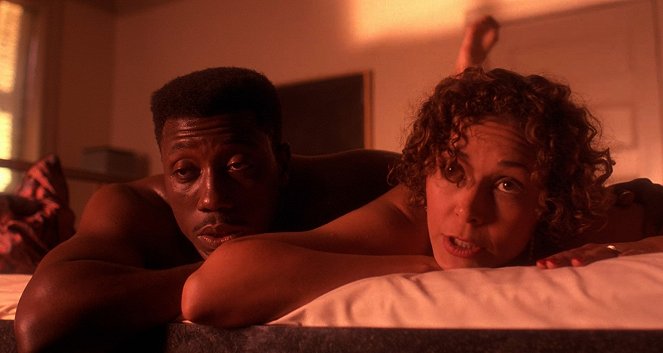Directed by:
Spike LeeScreenplay:
Spike LeeCinematography:
Ernest R. DickersonComposer:
Terence BlanchardCast:
Wesley Snipes, Annabella Sciorra, Spike Lee, Ossie Davis, Ruby Dee, Samuel L. Jackson, Lonette McKee, John Turturro, Frank Vincent, Anthony Quinn, Halle Berry (more)Plots(1)
When married architect Flipper (Wesley Snipes) begins an affair with his secretary Angie (Annabella Sciorra), neither anticipate the turmoil their romance unleashes. Drawn together by 'jungle fever' – sexualised racial myths rather than love – the couple struggle to reconcile their emotions with the social expectations that foster division between the black and white communities. Set on the streets of New York City in the early 1990s, Spike Lee's all‐star drama is a typically engaging and provocative examination of interracial relationships in the United States. (British Film Institute (BFI))
(more)Videos (1)
Reviews (1)
Jungle Fever is an activist film where the director's political attitudes play a dominant role, i.e., there's maximum emphasis on the emancipation of the black population in the USA and their social rise. In my opinion, it overdoes it because when, for example, a black woman finds out about her husband's infidelity, and yet, what is more important to her than the betrayal itself is that he betrayed his race with a white girl and she somehow overlooks the fact that the motivation was probably her younger age and the novelty. Practically all characters still deal with skin color and use this fact to justify their own opinions and the attitudes of others. The beginning of the 90s was of course not the same as today because, in those 20 years, the atmosphere in America has shifted. However, it was no longer the distinct 60s and besides, it's about New York, which has always had a special position and where the melting pot worked more reliably than anywhere else. So-called interracial marriages are not a common matter regardless of how the Hollywood mainstream looks and the TV productions of American stations, even today outside of big cities and university circles, but rather than skin color, religion or the class-based social caste system will probably play a role. In Jungle Fever, Spike Lee sometimes comes close to the more extreme positions of the Black Panthers and there is a sense of a fighting mood in him, which is typical in his early films as well. I prefer Spike Lee's later period when he abandoned this nationalist tone and made films like the stylish Inside Man. Overall impression: 60%.
()


